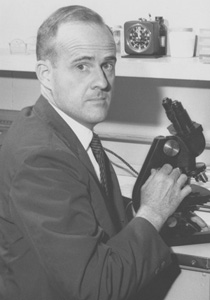 This Goodly Land
This Goodly Land
E. B. Sledge (November 4, 1923–March 3, 2001)

Other Names Used
- Eugene Bondurant Sledge: full name
- Sledgehammer: military service nickname
Alabama Connections
- Mobile, Mobile County: birthplace, childhood residence
- Marion, Perry County: education
- Auburn, Lee County: education
- Montevallo, Shelby County: adult residence
Selected Works
- Sledge, E. B. With the Old Breed at Peleliu and Okinawa. Novato, Calif.: Presidio Press, 1981. Rpt. New York: Presidio Press, 2007.
- Sledge, E. B. China Marine. Tuscaloosa: University of Alabama Press, 2002.
Biographical Information
E. B. Sledge was born and grew up in Mobile, Ala. His father, a physician, taught him to hunt and to accurately observe and describe his surroundings. After graduating from high school, he spent a year at Marion Military Institute and a brief period at the Georgia Institute of Technology in an officers’ training program. Sledge left the program in late 1943 to enlist in the US Marine Corps. After basic training, he was sent to the Pacific Theater. He fought at Peleliu and Okinawa where some of the fiercest battles of WWII took place. Despite heavy casualties in his unit, he survived without being physically wounded. It took him years, however, to recover from the psychological wounds from that experience. After the Japanese surrendered, Sledge was assigned to serve in China as part of the occupation force.
Sledge returned to Mobile after his tour of duty in 1946 but found it hard to readjust to civilian life. He earned a BS degree in 1949 from Alabama Polytechnic Institute (now Auburn University) and attempted to establish a career in the insurance business. On his father’s advice, he returned to Auburn for an MS in botany. In 1960, he graduated from the University of Florida with a PhD in zoology. After spending two years working for the Florida State Department of Agriculture, Sledge joined the biology faculty of Alabama College (now the University of Montevallo), where he taught until his retirement. Sledge initially wrote about his war experiences to explain them to his family, but he was persuaded by his wife to seek publication. The second book was published posthumously, twenty-one years after the first.
Interests and Themes
In his memoirs, E. B. Sledge attempted to engender respect and gratitude for the sacrifices made by combat veterans. His books are frank and detailed, and they convey the reality of the combat experience.
For More Information
Please check your local library for these materials. If items are not available locally, your librarian can help you borrow them through the InterLibrary Loan program. Your librarian can also help you find other information about this author.
There may be more information available through the databases in the Alabama Virtual Library. If you are an Alabama citizen, AVL can be used at your public library or school library media center. You can also get a username and password from your librarian to use AVL at home.
Reference Web Sites
- "Eugene B. Sledge Collection". Auburn University Digital Library. 2007. Auburn University Libraries. http://diglib.auburn.edu/collections/ebsledge/.
- Trehub, Aaron. "Eugene B. Sledge". The Encyclopedia of Alabama. 2008. Alabama Humanities Foundation and Auburn University. http://www.encyclopediaofalabama.org/face/Article.jsp?id=h-1796.
- Turkel, Studs. "Recordings From the Good War". Conversations With America. A Gallery of Historical Voices. 2002. Chicago Historical Society. http://www.studsterkel.org/gwar.php.
Location of Papers
- Auburn University
Photo courtesy of the E. B. Sledge Papers, Special Collections and Archives, Auburn University Libraries.
Last updated on May 30, 2008.